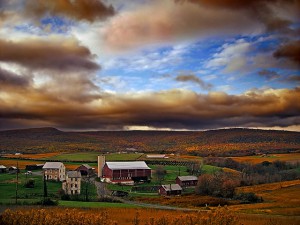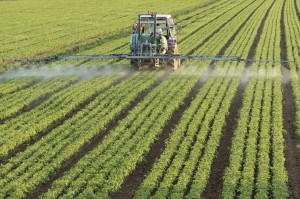Response to “Organic Farming Is Not Sustainable”
 Photo Credit: Nicholas A. Tonelli
Photo Credit: Nicholas A. Tonelli
The opinion piece in the Wall Street Journal on May 15 titled “Organic Farming Is Not Sustainable” by Henry Miller takes a very narrow and incomplete view of the environmental impacts of organic farming. Its limited nature misses the broader picture showing the sustainability advantages of organic practices – and the vast evidence of these advantages supported by scientific research. A comprehensive analysis of the issues brought up in Miller’s piece, such as nutrient leaching, greenhouse gas emissions, and soil health, would show that studies overwhelmingly conclude that organic systems are environmentally beneficial.
For example, the paper Miller cites examining nitrate leaching is an isolated study that looked only at intensive greenhouse production, and cannot be used to draw conclusions about field agriculture, or even low-input greenhouse production. In fact, most studies that examine nutrient runoff show that organic production methods result in reduced nitrogen losses when compared to conventional crop production. This evidence has been used to make recommendations on methods for decreasing algal blooms in the Great Lakes and the size of Dead Zones in the Gulf of Mexico and Chesapeake Bay. Iowa State University, for instance, addressed the issue of high nutrient pollution in the Mississippi River (which in turn contributes to the Gulf of Mexico Dead Zone) by proposing a plan that relies heavily on decreased use of synthetic fertilizer.
 Greenhouse gases emitted by composting are another issue brought up by the author. Discussions of climate change contributions need to take a holistic view of agricultural systems, rather than focusing on one small aspect of the farming process. When the overall greenhouse gas emission levels from organic agriculture are compared to those of conventional agriculture, studies consistently find that organic systems are less energy intensive and emit less greenhouse gas than conventional.
Greenhouse gases emitted by composting are another issue brought up by the author. Discussions of climate change contributions need to take a holistic view of agricultural systems, rather than focusing on one small aspect of the farming process. When the overall greenhouse gas emission levels from organic agriculture are compared to those of conventional agriculture, studies consistently find that organic systems are less energy intensive and emit less greenhouse gas than conventional.
The production of synthetic fertilizer used in conventional practices, for example, is extremely energy intensive and can result in higher greenhouse gas emissions than the use of compost, especially when the carbon sequestration of composting is taken into account. A study by Food and Agriculture Organization of the United Nations (FAO) scientists that took these multiple factors into account found that the emission reduction potential by abstaining from using mineral fertilizer would be about 20%, and the compensation potential by carbon sequestration would be 40-70% of the world’s current annual agricultural greenhouse gas emissions. Additionally, organically managed soils release lower levels of greenhouse gasses into the atmosphere than conventionally managed soils. A recent analysis of 19 comparative studies from around the globe examining emission levels found that, on average, organically managed soils release 492 kg less carbon dioxide per hectare per year than conventionally managed soils. Findings also showed that the uptake of methane on organic farms was higher than on conventional farms.
Miller also references reduced yields in organically managed crops. However, new studies are showing that the use of best management practices in organic systems over a long period of time can result in yields that are equal to, or even surpass those of conventional systems. For example, one recent study published in Crop Management summarizing results from the Iowa State Long-Term Agroecological Research Experiment demonstrated that organic yields increase the longer their fields are managed organically.
 Photo Credit: Natural Resources Conservation
Photo Credit: Natural Resources Conservation
The same study also disputes Miller’s claim that organic production is not beneficial to soil quality. The Iowa State researchers conclude that organic management resulted in healthier soil, as “organic plots had up to 40 percent more biologically-active soil organic matter, which is important for fertility and nutrient availability.” Organic soils had other health-related qualities, such as lower acidity and higher amounts of carbon, nitrogen, potassium, phosphorous and calcium than conventional soils. This study is not alone in its findings regarding the soil benefits of organic management. For example, a study published in the journal Ecological Indicators found that “organic management showed significantly better soil nutritional and microbiological conditions; with increased level of total nitrogen, nitrate and available phosphorus, and an increased microbial biomass content, and enzymatic activities.” Additionally, organic farming does not preclude the use of no-till techniques, as suggested by Miller, and there are several successful techniques for no-till farming developed specifically for organic systems.
Miller's attempt to "dispel the myth" that organic producers do not employ pesticides is not well researched and shows an unawareness of how organic farmers overcome pest pressures. For example, the article states that organic- allowed pesticides "include nicotine sulfate…, and rotenone." This information is incorrect. Nicotine sulfate is specifically listed as a prohibited substance in organic production (7 CFR 205.602(i)) and the National Organic Standards Board unanimously voted to disallow rotenone as of January 1, 2016.
Miller fails to mention the requirement that before organic farmers use any pesticide, they must first implement a pest prevention program. Pest prevention on organic farms includes attracting beneficial insects like ladybugs and rotating crops from field to field. It is only after this pest prevention strategy has failed, and pests are present, that an organic farmer may use limited amounts of organically approved pest-control materials. All farmers face pest problems, but organic farmers are required to prevent pests prior to treatment, and when they do need to treat for pest or disease issues, they are limited to substances that are safe to human health and the environment.
 Miller suggests that Genetically Modified (GM) crops are not used in organic production “simply because they were crafted with modern, superior techniques.” This statement overlooks the many environmental reasons behind avoiding GM crops. Environmental problems associated with the use of GM crops are unpredictable and difficult to mitigate. For example, transgene movement from GM crops to wild, weedy relatives could increase the invasiveness of weeds. Genetic modification has also resulted in higher pesticide applications in agricultural systems. A recent analysis of pesticide use in the United States by Dr. Charles Benbrook of the Center for Sustaining Agriculture and Natural Resources showed that the use of GM crops has led to a 239 million kilogram increase in herbicide use. This increase in herbicide application has taken a toll on biodiversity. Additionally, since the introduction of Roundup Ready crops, the number of glyphosate-resistant weeds has skyrocketed. Globally, there are now over 400 unique cases in the register of herbicide-resistant weeds, with the number continuing to grow. This could be especially problematic for farmers in developing countries who would have to bear the costly additional burden of higher pesticide input.
Miller suggests that Genetically Modified (GM) crops are not used in organic production “simply because they were crafted with modern, superior techniques.” This statement overlooks the many environmental reasons behind avoiding GM crops. Environmental problems associated with the use of GM crops are unpredictable and difficult to mitigate. For example, transgene movement from GM crops to wild, weedy relatives could increase the invasiveness of weeds. Genetic modification has also resulted in higher pesticide applications in agricultural systems. A recent analysis of pesticide use in the United States by Dr. Charles Benbrook of the Center for Sustaining Agriculture and Natural Resources showed that the use of GM crops has led to a 239 million kilogram increase in herbicide use. This increase in herbicide application has taken a toll on biodiversity. Additionally, since the introduction of Roundup Ready crops, the number of glyphosate-resistant weeds has skyrocketed. Globally, there are now over 400 unique cases in the register of herbicide-resistant weeds, with the number continuing to grow. This could be especially problematic for farmers in developing countries who would have to bear the costly additional burden of higher pesticide input.
In “Organic Farming Is Not Sustainable,” Miller fails to present a cohesive argument supporting his claims. The isolated practices pointed out by the author are small pieces of the larger picture, and are not applicable to many organic operations. When all the evidence is examined, it is easy to see that the majority of scientific studies support the environmental benefits of organic agriculture.


